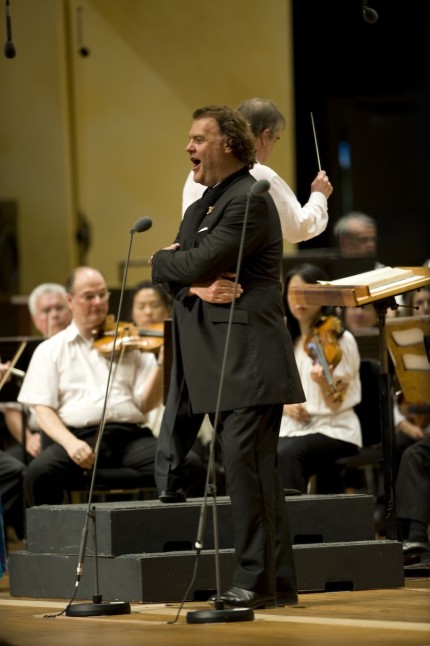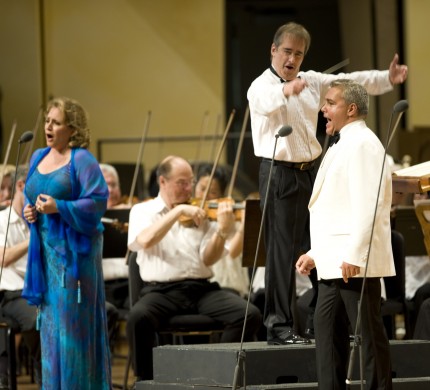Terfel’s gripping Scarpia ignites an outstanding “Tosca” at Ravinia

Bryn Terfel was a memorable Scarpia at Ravinia's concert performance of Puccini's "Tosca" Saturday night. Photo: Patrick Gipson/Ravinia Festival
The last time Ravinia programmed Tosca for a festival anniversary year (the 60th), local opera fans fell prey to one of Luciano Pavarotti’s legendary no-shows that peppered the later stages of his career.
Now in its 75th year, Ravinia boasted a sterling cast and a fluid reading of Puccini’s opera from James Conlon and the Chicago Symphony Orchestra on Saturday night. Even with the occasional dramatic sag, the faithful who braved yet another steamy July evening were rewarded with a memorable performance of Puccini’s durable melodrama.
The cast was at least as authoritative as the 2009 Lyric production, but with more Italianate flair and greater nuance in roles that can easily become cartoonish. The trio of leads included two-thirds of the spring Metropolitan Opera cast from the Luc Bondy production that continues to stoke controversy in opera circles.
At the core was a gripping, seething portrayal of the loathsome Scarpia by Bryn Terfel. The Welsh bass-baritone assumed a more static stage presence than the other cast members, yet he effortlessly commanded the full attention of a captivated audience with malevolent, coiled-spring intensity. His depiction of the sadistic police chief evolved from calm, confident brutality to wounded, vengeful fury, all evinced without bellowing or bombast.

Patricia Racette starred in the title role with Salvatore Licitra as Cavaradossi and James Conlon conducting the CSO in Ravinia's concert version of "Tosca." Photo: Patrick Gipson/Ravinia Festival
Italian tenor Salvatore Licitra has been well received at the Met and elsewhere for his idiomatic, dulcet-toned Cavaradossi. In this reading there was a hint of grain in a few top notes, as well as scenes in which he seemed needlessly risk-averse. On the whole his warm and ardent portrayal earned hearty and well-deserved kudos from his grateful admirers.
Soprano Patricia Racette has also scored triumphs with leading companies in the title role, and her absorbing performance Saturday affirmed her status as a leading Tosca of our time. She wasn’t as vocally dazzling as some who have personified the celebrated singer and jealous lover, but she brought an honest dignity to a role often overwrought by helpless despair.
With a production so dominated by the villain, it’s not surprising the performance slumped a bit in the third act with Scarpia dispatched. Conlon’s oddly disengaged orchestral opening didn’t help, and Licitra’s lovely but tepid E lucevan le stelle kept the drama subdued. It fell to Racette to bring the tragedy back to life, a feat she accomplished with ringing climaxes and soul-stirring desperation.
Bass Morris Robinson was glorious as the heroic Angelotti, and Dale Travis was an amusingly animated Sacristan. The Apollo Chorus of Chicago provided bracing, full-throated support, though once again the CSO chorus was missed. The Chicago Children’s Choir was a delight, as was young Henry Griffin as the shepherd boy.
The CSO was in fine form, most notably the principal winds, horns, and lower brass. A more palpable sense of involvement from the podium might have lifted the affair from merely superb to spectacular. Still, one simply doesn’t hear a pit band with this level of power, authority, and polish.